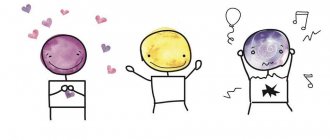Mood hormones July 18, 2021, 00:00 | Katya Kozhevnikova
4 chosen
What affects our mood? Good luck at work, a good movie or hurtful words accidentally spoken by your husband? In fact, our emotional state directly depends on the complex processes occurring in the body. Hormonal levels not only affect mood, but also shape character and temperament: it divides people into optimists and pessimists, modest and decisive, kind and aggressive. Let's figure out which hormones affect us so much and think about whether we can somehow influence them.
Endorphins
Let's start with pleasant hormones. Perhaps everyone has heard that endorphins are hormones of joy. They are even called “natural happiness drugs.” They are much stronger than any antidepressants, cause euphoria, help cope with stress and reduce pain. When we have enough endorphins in our blood, we are in a great mood and enjoy even insignificant things. But with a lack of this hormone, a person becomes lethargic and depressed.
Some fruits and berries (strawberries, grapes, bananas), as well as the favorite treat of all those with a sweet tooth – chocolate, can slightly increase the level of endorphins. In addition, it is useful to play sports (best of all - dancing), be in the sun more often and be sure to laugh. Therefore, an evening spent watching light comedy is not such a useless activity.
Serotonin
Another “happiness hormone”. Although in fact, serotonin is a neurotransmitter that affects a large number of processes occurring in our body. It also affects thermoregulation, blood clotting, and the perception of pain. Serotonin has a positive effect on motor and cognitive activity, emotional stability, gives self-confidence, and reduces susceptibility to stress hormones. And, of course, it improves your mood. Therefore, high levels of serotonin often bring a person success in their career. And its deficiency can cause depression.
For normal production of serotonin, you need a sufficient amount of trypophan (this amino acid is found in nuts, seafood, chocolate, dairy and meat products), magnesium and B vitamins (cereals and liver), carbohydrates (have you noticed how low-carb diets worsen your mood?) Try as much as possible spend more time in the fresh air. Lack of sunlight reduces the production of serotonin - this is what seasonal autumn-winter depression is associated with. Well, enjoy life! The better our mood, the better serotonin is produced. And the more serotonin, the better your mood.
Oxytocin
Oxytocin is the bonding hormone. Thanks to him, we experience love, tenderness and devotion. In addition, he is responsible for the maternal instinct. Oxytocin is produced in large quantities during childbirth and during breastfeeding. In ordinary life, close communication with loved ones increases the level of oxytocin. And among the foods that stimulate its production, bananas and avocados.
Dopamine
This hormone helps us quickly adapt to new conditions. People who have it in abundance learn quickly and do not get lost in difficult situations. And those who lack it are indecisive and unsure of themselves. But there is also the other side of the coin - dopamine reinforces bad habits.
B vitamins, magnesium and zinc help stimulate the production of this hormone.
Adrenalin
Adrenaline is the hormone of fear. It is produced in the blood in stressful situations and causes the heart to beat faster and muscles to tense. The reaction speed increases, and sensitivity to pain, on the contrary, decreases. People who have too much of it are prone to risk and aggression. On the other hand, those who lack adrenaline get lost in stressful situations and give in to difficulties. It turns out that some people should lower the level of this hormone, while others should increase it.
Adrenaline levels increase through sport, and even more so through fear. This is probably why extreme sports are so popular. Reduce – meditation, calm music, herbal teas.
Thyroxine
Thyroxine is another stress hormone. Its excess makes us nervous and irritable. You can reduce thyroxine levels during active sports. Many people know this recipe and always go to the gym to calm down.
Of course, miracles don't happen. You can't eat chocolate and get rid of depression. Our hormonal levels are influenced by many factors: health status, environmental conditions and, finally, our individual characteristics. But it is still possible to slightly adjust the amount of certain hormones. Or at least not interfere with the body’s production of them.
Have you felt how hormones affect your mood?
By the way…
In addition, certain smells also affect our mood. For example, citrus scents make us happier, more cheerful and confident.
| Coco Mademoiselle, CHANEL | Flora Garden Mandarin Eau de Toilette, Gucci | Velvet Sublime Eau de Parfum, Dolce&Gabbana | ||
Katya Kozhevnikova , iledebeaute.ru
What is a mood
Our spiritual sphere has a large number of components, including emotions and feelings. Our emotions are determined by situations: we are angry at a specific action or happy about certain actions. Feelings are always an attitude towards an object, an object - I love this dog, I am satisfied with the work done, etc.
Mood
- this is the general emotional background at the current moment in time, independent of the object or circumstances.
Of course, there may be an external factor that influenced a sharp deterioration in mood (a person or an event), however, when it disappears, we do not feel better.
The internal state is important for a person; how our day, and therefore life, will go depends on it.
The distinctive features of mood from other emotional components are:
- The brightness of the emotional background is lower than that of feelings or emotions
. A sad mood is not as actively experienced as rage or anger. If it is good, then it does not manifest itself too strongly on the outside; we can jump for joy, rather with emotions of happiness and delight. - Mood is a longer lasting state than emotion
. The latter lasts seconds and minutes, the mood may not change for days and weeks. - Lack of awareness of the reasons for a particular mood
. Our emotional mood is in most cases unaccountable, the subject of mood changes is absent or poorly defined: a person is “overwhelmed.” - Mood has a contagion effect
. If it is good, then the sky seems bluer and the work progresses. When your mood is low, it affects both your actions and your attitude towards other people. For example, a pleasant person begins to irritate. - The mood is very multifaceted, it has a large number of components
. It happens that a person himself is not able to describe and analyze it. In addition, the mood can combine different emotions. A mother giving her daughter away in marriage is both happy and sad at the same time.
Like other emotions, mood can be inspiring and exciting, or it can negatively impact productivity. In psychology, there are still no unified approaches to the nature of the emergence of this or that emotional background; the factors that cause it have not been definitively identified.
At the same time, the functions of this phenomenon are clearly established:
- A person's mood can tell others a lot about the individual's needs.
- Attitude determines a person’s acceptance of a specific behavioral model.
- The emotional state leads to self-regulation and forces one to adapt to external factors.
Another indisputable statement is that the mood is based on physiological factors: hormonal and biochemical processes occurring in the body.
Additional influence
In fact, the production of hormones is a complex process that can be disrupted by many minor factors. One of these is dehydration of the body, since with insufficient fluid intake, the distribution of substances in organs and the nervous system is disrupted. Thus, if you drink little water, you can provoke a lack of endorphins in the body, and as a result, you can get depression, sleep disturbances, decreased performance, and even the occurrence of Alzheimer’s and Parkinson’s diseases.
In other words, the mood of a man or woman largely depends on compliance with the diet. For a good mood and proper metabolism, all you need to do is drink at least 2 liters of clean water every day.
The reason for the disruption of the production of melatonin and serotonin is the presence of free radicals in the body. Nerve tissues are especially sensitive to such substances, so a lack of oxygen in the brain also quickly provokes a deterioration in mood. Prolonged stay in this state causes depression.
What kind of mood is there?
With all the variety of types of mood, a person usually characterizes it as good or bad.
A bad mood is...
The symptoms of low mood are known to everyone:
- everything seems hateful;
- laziness overcomes;
- there is no desire to communicate with family and friends.
Depending on mental characteristics, a person tries to either hide from the world or take it out on loved ones. We do not always understand the reasons for our condition, it is important to know one thing - a bad mood is an indicator that not everything is going well in our lives.
It is necessary to understand the causes of decreased tone, especially if the condition recurs regularly. After all, a bad mood that persists for a long time is already depression that needs to be treated. Constant despondency provokes other bodily ailments, including oncology.
Most often, this tone causes dissatisfaction with oneself, a feeling of guilt, and a lack of purpose. Calmly analyze what could have caused the decline in emotional background. A bad mood is a reason to delve into yourself. Why have I stopped loving myself so much that I allow sadness to ruin my life?
Eradicate dislike for yourself, pamper yourself like a little child. Sometimes a bad mood is a reaction to pathological processes in the body, changes in hormonal levels. In this case, you should consult a doctor for an examination.
good
A person in a cheerful mood can be identified even visually. He has a straight back and a mischievous look. Physiological processes are activated - the stress hormone cortisol is absent, heart function improves, facial muscles are relaxed, and an involuntary smile appears. Optimists and cheerful people look very young for quite a long time, their nasolabial folds are less pronounced.
In a good mood, we are ready to “move mountains”; any activity is productive and interesting. We enjoy doing household chores, finding pleasure in cleaning the apartment and plowing the potato field. At work, at such moments, we are able to redo everything that we have been putting off for a long time.
A person can hum, reaches out to people, they are close to him, and the level of empathy increases. There is a tendency to help people “just like that”, without demanding anything in return. Even old enemies don’t seem so unpleasant, and you don’t even want to think about them at all.
Creativity in this state also increases - new ideas appear, you want to engage in creativity or sports. A person thinks through plans to improve himself and his life - take up physical training, find a new source of income. I want to rearrange the furniture in my apartment and buy a new tablecloth.
A good mood is an emotional uplift, which has a great effect on health, appearance and leads to productive activity.
Serotonin
The hormone is found in small quantities in all organs, but a large proportion of it in the body is located in the gastrointestinal tract. That is, it is the health and stable functioning of the digestive system that are largely responsible for a good mood. Of course, the mood depends not only on this. Most of the substance is still located in the brain, from where the functioning of cells throughout the body is regulated. A sufficient amount of serotonin is responsible for concentration, sexual desire, memory, performance and social behavior. What does your mood depend on on bad days? Perhaps it is the lack of the hormone in the body that provokes loss of strength, anxiety, absent-mindedness, stress and other negative emotions.
With a sufficient amount of serotonin in a person, a calm, stable reaction occurs to almost any external stimulus. Such people radiate happiness and joy, and are much less likely to get cancer, since the hormone is able to cope with the formation of “bad” cells in the body.
This substance affects appetite, sleep and feelings of pleasure.
Types of moods
Bad and good mood are states that we understand, but this classification is very simplified. In addition, conflicting emotions can be mixed at the same time.
For example, you met an old school friend. On the one hand, you are glad that you saw her and talked. On the other hand, you are embarrassed because it took you a long time to find answers to the questions. In addition, you may be disappointed that you didn't look your best.
In addition to good and bad, psychology distinguishes the following types of mood.
Sad
Characterized by a low emotional background and passive actions.
Predominant emotions:
- Boredom.
- Anxiety.
- Laziness.
- Fear.
- Closedness.
The person is not confident in himself, the level of self-esteem is low. Melancholy, apathy, sadness, melancholy, and aversion to any type of activity sets in.
Working
The mood is neutral, there is no particular joy, the level of activity is moderately active.
Human condition:
Cheerful. There is aspiration towards the goal. Expressed interest in productive work.
In a working mood, we are aimed at achieving success and get down to business with enthusiasm.
Joyful
Characterized by increased emotional tone and active actions.
Characteristic emotions:
- Delight.
- Inspiration.
- Optimism.
- Euphoria.
A person is at the mercy of such feelings as love, trust, faith in success. The level of determination and desire to act is increased.
Negative
The emotional background is elevated, negative in nature, with a desire for active actions of a destructive nature.
Emotions experienced:
- Aggression.
- Anger.
- Fury.
- Annoyance.
- Disgust.
- Contempt.
- Resentment.
- Guilt.
Often arising against the backdrop of unforeseen undesirable situations, negative actions can be directed towards other people and even inanimate objects. A person is capable of hitting, starting to destroy pieces of furniture, i.e. throw out irritation outward.
Neutral
The emotional tone is muted, perhaps slightly increased, but the activity is low.
Characteristics of this mood:
- Expectation.
- Abstraction.
- Contemplation.
In such states, we observe what is happening from the outside, analyze events and people’s actions, and draw conclusions. This is a kind of emotional rest, calm contemplation of reality.
The presented classification is also incomplete and cannot reflect all the shades of emotional states inherent in a person. People often confuse the concept of a bad or sad mood with depression. This is fundamentally wrong.
We have already said that mood is distinguished by such a feature as a short duration in time. If sadness and apathy last for weeks, it is necessary to undergo treatment, this is a pathology.
Endorphins
Only a person whose endorphin levels are normal feels absolutely happy, full of strength and energy and an optimist. These biological compounds not only lift your mood, but also ensure the conduction of all nerve impulses, which accelerates the enjoyment of all the “hormones of happiness.” What does your mood depend on if today is the worst day, and you yourself are the most unhappy of all people? Most likely, the matter is a lack of endorphin in the body. This substance is very similar in formula to most narcotic substances, and has a similar effect on humans. The feeling of euphoria and happiness gives a person lightness and carelessness. In addition, hormones have anti-inflammatory, analgesic and antipyretic effects, which speeds up recovery and alleviates the course of any illness.
I wonder what determines your mood during pregnancy? Just from the level of this substance in the blood. During pregnancy, the amount of endorphins in the body increases sharply, so many find it difficult to cope with sudden mood swings. During childbirth, the hormone is abruptly removed from the body, which often provokes postpartum depression and neuroses. Scientists believe that disruption of the synthesis of this substance is the cause of chronic pain syndromes.
Factors influencing a person's mood
It is within the power of a person to raise his morale, try to cheer up and tune in to a positive mood. But the reasons for our mood are often unconscious. How can factors influence it?
Physical condition of the body
"In a healthy body healthy mind!" - This is true. Our mood is closely related to the state of various systems: endocrine, vegetative-vascular, nervous, hormonal.
Mood swings often occur due to hormonal imbalances, and heart problems lead to emotions of fear and melancholy. Many people know what a disgusting mood after drinking a large amount of alcohol, the poisoned body takes revenge on its owner.
It happens that neurons limit the production of proteins serotonin and dopamine, which are hormones of joy and happiness, then despondency and melancholy set in. The state of health is not among the primary factors of melancholy or mood, only in the presence of severe mental or physical disorders.
Objective circumstances
The leading reasons influencing the emotional background are external factors. Any event that does not seem worthy of attention at first glance can contribute to a change in mood. Moreover, it is difficult to immediately say in which direction our emotions will move.
Imagine early spring, you went outside, the sun is shining brightly after a long winter. This fact can fill you with joy for the whole day; we, like any living creature, have been strengthened by the energy of the luminary. But, literally, after 100 meters, a passing car splashed your expensive suit, and now the state of euphoria has already disappeared somewhere, giving way to annoyance and irritation.
Psychologists believe that further emotional background will depend on two factors:
- the significance of each circumstance personally for the person;
- an individual's predisposition to perceive positive or negative emotions.
For one of us, rain is a spoiled mood for the whole day, for the second it is an opportunity to run through puddles, like in childhood, and read a book at home.
There are external reasons that will definitely plunge a person into a serious state - death or separation from loved ones, loss of livelihood, illness of a child, news of losses, etc. No sane person would have fun in such situations. Nevertheless, there is a way out of any trouble (except death), a mature person will look for it and find it. Prolonged suffering will lead to loss of meaning in life and psychological pathologies.
Mental characteristics of personality
All people are divided conditionally into 4 psychotypes, on which their characteristic emotional background depends:
- Phlegmatic people do not get excited by momentary emotions
. Their mood is maintained for a long time and is not subject to frequent changes. The experiences of phlegmatic people have a calm course, they are smoothed out. Therefore, the mood of such people is mainly neutral or working. - Cholerics flare up like matches
. Emotions and feelings are always sharp, bright, if there is delight, then to a squeal, if anger, then to assault. Their life is an emotional swing. But experiences do not last long; they quickly cool down. Accordingly, the mood with such a temperament changes quickly (five minutes of laughter, five minutes of tears). - Melancholic people are always in a state of unaccountable sadness
. Remember Pierrot from the fairy tale about the wooden Pinocchio. Such people have a low emotional background and are unable to experience bright positive emotions. Any external obstacle can ruin an already bad mood. - Sanguine people are able to experience vivid feelings, but their emotions are closer to calm
. Such people do not dwell on the negative for a long time, have high self-esteem, and are able to control their mood. They spend most of their time in a cheerful mood, sometimes in a neutral state.
When we learn to recognize the factors that influence our mood, we can change it.
Lack of microelements
The body's main defender against free radicals is selenium, so its deficiency is directly related to good health. The microelement is responsible for youth, health and longevity, and, according to recent research, also for mood. What does his change depend on? Scientists believe that this is due to a disruption in the production of antioxidants due to a lack of the substance in the body, which leads to a malfunction in the production and functioning of key neurotransmitters. With sufficient levels of selenium in the body, a person feels more confident, cheerful and less anxious.
The thyroid gland, which largely controls emotions, reacts very sharply to selenium deficiency.
Do you want to know what determines a child’s mood? Check his thyroid gland, because in Russia almost 90% of the population suffers from a lack of iodine and selenium, which provokes anxiety, depression and sudden mood swings.
Zinc, which is an antidepressant and anti-stress mineral, also influences the stabilization of emotions. A deficiency of this element is observed in 60% of people, so many people complain of poor health. Anger, irritability, despondency and depression are not all the feelings that accompany people with a lack of zinc in the body.
How to cheer yourself up
It is imperative to improve our emotional mood, because it affects our affairs and physical well-being. If it seems that it is impossible to improve your mood, remember Baron Munchausen, who pulled himself out of the swamp.
Let's give some recommendations:
- Make it a habit to start every morning with pleasant thoughts
. Dream about the great things that lie ahead for you. Remember that a new day is a gift from fate and an opportunity to start a new life. Don't worry about possible troubles in advance; they haven't happened. - Try to think and talk only about health and success
. The subconscious mind will remember the settings and give the command for appropriate actions. “What goes around comes around” - this proverb also applies to thoughts and attitudes. “Now is the time to make the best use of time. Today is the day to have a perfect day." These phrases should become a daily motto.
- To any psychological garbage, be it an obsessive negative thought or unsolicited criticism, say: “Stop”
. Take a broom and sweep the unnecessary rubbish out of your head.
- Increase self-esteem, a confident person knows how to control emotions
. He is so independent that he will not adapt to negative experiences; he wants and can live for his own pleasure. For the same reason, do not compare yourself to anyone and do not rely on the opinions of others. Only you yourself must manage your life.
- Give yourself aesthetic pleasure
. Do your hair, put on your favorite dress, take out your perfume. Brew aromatic coffee with cream or pour your favorite herbal tea. If the body is happy, the soul will be happy too!
- Try, if possible, to change something in the space around you
. You can rearrange the furniture, clean up the mess, put a bowl of sweets or fruit on the table. External beauty can change your mood. The pleasure of what you see will go straight to the brain, which will set the mood for positive emotions.
- Physical activity is a great way to relieve the blues, you can just walk or run, jump, dance
. Sex is a powerful antidepressant.
The main thing is to accept everything you have with gratitude. Say: “thank you for having...”. When you start listing what you have (luxurious hair, big or girlish breasts, your home, a beautiful child, kind parents, a cool dog, a new mug, a flower in a pot, a friend from school, a lover or husband, etc.), You will understand what value you are and what values you hold in your hands!
You constantly replay the worst possible scenarios in your head.
When your brain imagines the worst thing that could happen, it tries to prepare you for it. However, this approach only increases anxiety, so changing your thinking is important and necessary.
Of course, you shouldn’t look at the world through rose-colored glasses and ignore problems. It is enough to objectively perceive what is happening and see the immediate future.
How to cheer yourself up
When bad thoughts take over, ask yourself two simple questions:
- Is there evidence that this can actually happen?
- How to look at the situation in a neutral or even advantageous light?
This approach is called cognitive restructuring Understanding Cognitive Restructuring / Verywell Mind, and it can have a positive effect on mood.
Then try to look for a solution to the problem and look at it more broadly - this will help you return to an active position again.
Who should pay special attention to nutrition?
Nutrition plays a key role in brain function throughout life, and becomes even more important as we age, the study authors say. According to Professor Jak, a healthy diet is especially necessary for children and adolescents.
Photo: unsplash.com/@kellysikkema
In addition, the way pregnant women eat can affect the mental health of their unborn children. “We studied more than 23,000 cases in Norway and found that children whose mothers ate more unhealthy foods during pregnancy were more likely to engage in psychologically unhealthy behavior in the first years of life,” the paper says.
What foods help lower blood pressure?











